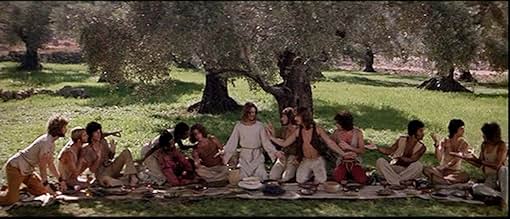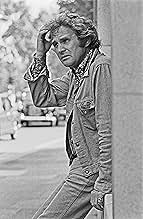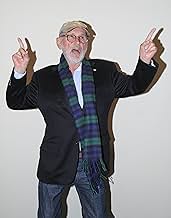Version cinématographique de la pièce de théâtre musicale, présentant les dernières semaines de la vie du Christ racontées de manière anachronique.Version cinématographique de la pièce de théâtre musicale, présentant les dernières semaines de la vie du Christ racontées de manière anachronique.Version cinématographique de la pièce de théâtre musicale, présentant les dernières semaines de la vie du Christ racontées de manière anachronique.
- Director
- Writers
- Stars
- Nommé pour 1 oscar
- 3 victoires et 13 nominations au total
Larry Marshall
- Simon Zealotes
- (as Larry T. Marshall)
Josh Mostel
- King Herod
- (as Joshua Mostel)
Kurt Yahjian
- Annas
- (as Kurt Yaghjian)
Paul Thomas
- Peter
- (as Philip Toubus)
Jeff Hyslop
- Apostle
- (as Jeffrey Hyslop)
Avis en vedette
Jesus Christ Superstar was an excellent movie and an excellent play. I first heard the soundtrack and then saw the movie, and the movie definitely fills in all of the blanks. I was confused in the beginning, when they all rode up in a bus, but I later caught on. Other than that the movie was great, the voices were great, (especially Judas, he really added anger and sorrow to his part) and the setting was perfect. I found it humorous when there were the anachronisms such as grenades and guns at the market. This was a great movie and I will watch it again and again. I am normally skeptical of musicals but I will always hold this close to my heart. This movie should be seen by anyone, and everyone. Peace!
Carl Anderson's hope of being immortal rested on the shoulders of his perfect performance as Judas in Jesus Christ Superstar. Even though the Academy Awards forgot to list him as one of the lost actors of 2003, Carl Anderson will forever be alive and remembered as long as this movie is around. More than 30 years have pasted and it is still breath taking in more ways than one. No matter what you believe, the images, music, and the passion of this movie are powerful. Anderson was content knowing that he lived long enough to see Jesus Christ Superstar become a masterpiece in the eyes of the world. What he didn't know was it was a masterpiece the day it premiered back in 1973.
I've heard much criticism of this film over many years, and the most annoying criticism is that it didn't have the vitality of the stage productions back "in the day". There isn't much many of us can do about that, though I did see a road production of it about 7 or 8 years ago.
The most interesting thing about this film is that it was set in "modern" times, rather than in biblical times. Roman soldiers wearing shiny helmets, and carrying machine guns is a real attention grabber. The ruins used in the film added another fascinating aspect to the production. In short, the anachronistic approach in the visuals, the lyrics, and the music itself make this a genuinely unique, and clever film.
I thought all the acting, singing, and dancing was great, and still appears to be rather fresh and modern. The lyrics were the most memorable of any movie I've ever seen. There were many of us that could quickly memorize the entire opera from listening to the soundtrack (no videos back then), and have much fun "play acting" ourselves.
The use of Judas as a primary character was probably the single most important aspect of the film. One has to wonder how Judas became one of the inner circle of disciples if he was such an evil crud to begin with. In church he is simply mentioned as being a traitor. The film/musical asks us to think more on this individual, and speculate as to his true nature as a human being. The only other person I know of that attempted to do this was Taylor Caldwell in her novel "I Judas". The point that the crucifixion/resurrection hinged on the betrayal of Judas, should make any Christian wonder if God actually worked through him, and that he wasn't actually "damned for all time."
People seem to be offended by the light-hearted (and hysterically funny!) "King Herod's Song." What does the Bible say about this meeting? Certainly it doesn't say that this was an amicable meeting, and indeed, I seem to remember Jesus being beaten on the palace grounds. The look on Neely's face throughout the Herod song-and-dance is one of seriousness that belies the true nature of what was going on in this scene. This served to remind the viewer that this wasn't sheer levity, and held the scene together in its proper context until it ran full circle with Herod "spazzing" and showing rabid, rather than merely sarcastic hatred for Christ at the end. This was sheer genius and master film craft in my book. I don't think Jesus' expression would come out as well in the stage version. The reservations Pilate had about authorizing the crucifixion seem to come out in the Bible as well. So-called Christians hold Pilate responsible, though there was probably many political things going on that are only vaguely alluded to in the Bible. Non-biblical tradition says that he and his wife, Claudia Procula, eventually converted to Christianity themselves. Who knows?
My least-favorite parts: "I Don't Know How to Love Him" reminds me a lot of "As Long as He Needs Me" in Oliver!. Both songs are plodding, and brings each film to a screeching halt. I believe that this was actually intended to be a pop song, but was thrown in when Webber and Rice were composing the opera. Still, Judas singing this through his tears towards the end of the film was very chilling. "Hosanna, Hosanna" I also find to be rather trite...still...the last stanza never fails to give me goose bumps when the crowd asks if Christ will die for them. Simon Zealot's prolonged screaming (and off key/beat) never fails to annoy me...then again, he was a rebellious zealot after all. The "falling down push up" move in this dance sequence bugs me, too. Another part that bothers me is that suddenly it was Pilate's dream, rather than his wife's as stated in the bible. I guess they did this to narrow the canvas (simplify the number of key characters). But, what a beautiful song! And, I thought the fact that nobody in the cast looked to be much over 25 was kind of weird.
My favorite parts: Caiphas' baritone and Annas' falsetto counterpoint. "Too Much Heaven on Their Minds." The guy with the froggy voice heckling Christ as he's shuffled between Herod and Pilate. The gorgeous girl in the purple shirt (dancer in the Zealot scene)...WHO IS SHE????? Any scene with Judas in it. The montage of crucifixion scenes. The great guitar (all the instrumentation for that matter), and something I wish they had MUCH more of in the movie, that incredible electric piano. I would buy just the instrumental track if it was available.
The most interesting thing about this film is that it was set in "modern" times, rather than in biblical times. Roman soldiers wearing shiny helmets, and carrying machine guns is a real attention grabber. The ruins used in the film added another fascinating aspect to the production. In short, the anachronistic approach in the visuals, the lyrics, and the music itself make this a genuinely unique, and clever film.
I thought all the acting, singing, and dancing was great, and still appears to be rather fresh and modern. The lyrics were the most memorable of any movie I've ever seen. There were many of us that could quickly memorize the entire opera from listening to the soundtrack (no videos back then), and have much fun "play acting" ourselves.
The use of Judas as a primary character was probably the single most important aspect of the film. One has to wonder how Judas became one of the inner circle of disciples if he was such an evil crud to begin with. In church he is simply mentioned as being a traitor. The film/musical asks us to think more on this individual, and speculate as to his true nature as a human being. The only other person I know of that attempted to do this was Taylor Caldwell in her novel "I Judas". The point that the crucifixion/resurrection hinged on the betrayal of Judas, should make any Christian wonder if God actually worked through him, and that he wasn't actually "damned for all time."
People seem to be offended by the light-hearted (and hysterically funny!) "King Herod's Song." What does the Bible say about this meeting? Certainly it doesn't say that this was an amicable meeting, and indeed, I seem to remember Jesus being beaten on the palace grounds. The look on Neely's face throughout the Herod song-and-dance is one of seriousness that belies the true nature of what was going on in this scene. This served to remind the viewer that this wasn't sheer levity, and held the scene together in its proper context until it ran full circle with Herod "spazzing" and showing rabid, rather than merely sarcastic hatred for Christ at the end. This was sheer genius and master film craft in my book. I don't think Jesus' expression would come out as well in the stage version. The reservations Pilate had about authorizing the crucifixion seem to come out in the Bible as well. So-called Christians hold Pilate responsible, though there was probably many political things going on that are only vaguely alluded to in the Bible. Non-biblical tradition says that he and his wife, Claudia Procula, eventually converted to Christianity themselves. Who knows?
My least-favorite parts: "I Don't Know How to Love Him" reminds me a lot of "As Long as He Needs Me" in Oliver!. Both songs are plodding, and brings each film to a screeching halt. I believe that this was actually intended to be a pop song, but was thrown in when Webber and Rice were composing the opera. Still, Judas singing this through his tears towards the end of the film was very chilling. "Hosanna, Hosanna" I also find to be rather trite...still...the last stanza never fails to give me goose bumps when the crowd asks if Christ will die for them. Simon Zealot's prolonged screaming (and off key/beat) never fails to annoy me...then again, he was a rebellious zealot after all. The "falling down push up" move in this dance sequence bugs me, too. Another part that bothers me is that suddenly it was Pilate's dream, rather than his wife's as stated in the bible. I guess they did this to narrow the canvas (simplify the number of key characters). But, what a beautiful song! And, I thought the fact that nobody in the cast looked to be much over 25 was kind of weird.
My favorite parts: Caiphas' baritone and Annas' falsetto counterpoint. "Too Much Heaven on Their Minds." The guy with the froggy voice heckling Christ as he's shuffled between Herod and Pilate. The gorgeous girl in the purple shirt (dancer in the Zealot scene)...WHO IS SHE????? Any scene with Judas in it. The montage of crucifixion scenes. The great guitar (all the instrumentation for that matter), and something I wish they had MUCH more of in the movie, that incredible electric piano. I would buy just the instrumental track if it was available.
I saw the stage version as a teenager and memorized the entire record during the summer of 1971. I don't remember when I first saw the movie, but I hated it. I didn't think that the Broadway show translated well at all. I am watching it right now, however, and I finally get it. It is a marvelous piece of work.
I am appalled at the people who have criticized it for not being accurate to the New Testament, therefore, not relevant. Quite the contrary, I border on agnosticism and seeing this movie for the first time in 20 years has been a spiritual experience for me. It still speaks to me after 35 years.
I also can't believe people who dismiss the music in and of itself. Are you crazy?
I am appalled at the people who have criticized it for not being accurate to the New Testament, therefore, not relevant. Quite the contrary, I border on agnosticism and seeing this movie for the first time in 20 years has been a spiritual experience for me. It still speaks to me after 35 years.
I also can't believe people who dismiss the music in and of itself. Are you crazy?
10vpup01
My mom (a hard-core Lutheran) thought this movie, "Jesus Christ Superstar" would deepen our faith in religion. She took me (age 12), my brother (age 14), my sister (age 11) and several neighborhood kids all the way across town where our minds proceeded to be "blown" in the most amazing, positive way! Those were the days when you could stay and watch the movie over and over and over (without buying another ticket). I walked out of the Georgetown Theatre in Indianapolis, Indiana suddenly knowing that somewhere in this big bleak world, I may actually fit in for once. All the previously-boring religious training I'd endured (parochial school) suddenly made some kind of sense and my idea of who and what God is, was and could be was changed forever! I still watch this film when I feel down and out and always feel spiritually renewed. The dancing, costumes, singing, story, cinematography, not to mention the hippie-themed visual fun-fest continues to thrill and amaze me! I give it two thumbs way way way up! P.S. I watched it three times that August day back in 1973......best time I EVER invested.
Le saviez-vous
- AnecdotesNorman Jewison managed only two takes of "The Temple" before he ran out of unbroken props, due to Ted Neeley's unrestrained energy when Jesus smashes everything.
- GaffesDifferences from the source material are not to be counted as goofs. Historical inaccuracies, such as tanks and guns in the year 0033, are also not counted as goofs, especially when related to artistic decisions.
- ConnexionsFeatured in The Directors: The Films of Norman Jewison (1999)
Meilleurs choix
Connectez-vous pour évaluer et surveiller les recommandations personnalisées
Détails
- Date de sortie
- Pays d’origine
- Langue
- Aussi connu sous le nom de
- Jesucristo Superstar
- Lieux de tournage
- Dead Sea, Israël(King Herod's Song)
- société de production
- Consultez plus de crédits d'entreprise sur IMDbPro
Box-office
- Brut – à l'échelle mondiale
- 101 975 $ US
- Durée
- 1h 46m(106 min)
- Couleur
- Rapport de forme
- 2.39 : 1
Contribuer à cette page
Suggérer une modification ou ajouter du contenu manquant





























